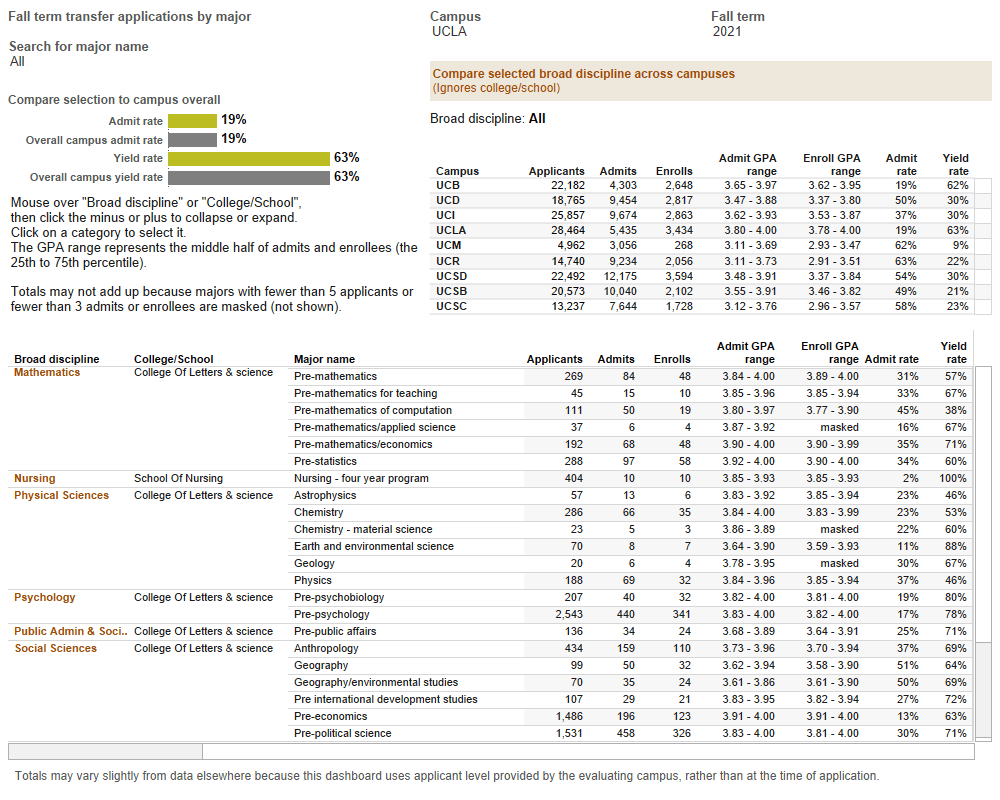The University of California Los Angeles (UCLA) is a selective institution with thousands of applications submitted yearly. This blog post will evaluate five impacted majors at UCLA that students should know about if they are interested in transferring to the university.
We will explore an impacted major, how many students it affects, and what they need to do to make the best decision about declaring their major.
Every major is unique and has different requirements and coursework that transfer students must take into consideration before making a choice.
Additionally, we will discuss how students can seek help from the advising and counseling departments at UCLA to ensure that they make the best choice for their future career goals and academic aspirations.
Impacted Majors Explained: What Are They?
Most colleges have a handful of majors that are more popular than others and tend to be impacted by the number of students who want to declare their major.
When a college or university declares a major to be impacted, it means that the demand for that major exceeds the resources and capacity of the school. In most cases, this is due to the popularity of the major and the number of students who declare it each year.

While some schools may use a first-come, first-serve model to determine who gets into an impacted major, others may use a more holistic approach that considers factors like GPA, test scores, and essays.
Recommended Reading: Guarantee Your Acceptance to a UC with TAG UC!
With an impacted major, it’s important to consult with an advisor as early as possible to ensure you’re on track to graduate promptly.
Common Capped Majors Across UCs
UCs differ in location, size, and course offerings, so it should not be surprising to learn that different majors are impacted at different UCs.
Related: 9 Things You Must Do in High School to be Competitive for UC Admission
First, the University of California (UC) system comprises nine campuses. Every UC offers something different for prospective students. This is evident by the different choices amongst the most popular majors at each school (listed below the institution).
- UC San Diego
- Biology, Mathematics, Economics, Computer Science & Engineering, Chemistry
- UCLA
- Political Science, Psychology, Sociology, Economics, Biology
- UC Merced
- Biological Sciences, Psychology, Management & Business Economics, Mechanical Engineering, Computer Science & Engineering
- UC Davis
- Psychology, Managerial Economics, Economics, Neurobiology, Biological Sciences
- UC Santa Barbara
- Biological Sciences, Economics, Psychological & Brain Sciences, Communication, Sociology
- UC Berkeley
- Computer Science, Electrical Engineering, Economics, Political Science, Business Admin
Related: 11 Impacted Majors at UC Berkeley | 2025-2026 Admit Rates & Average GPA
- UC Irvine
- Computer Science, Economics, Psychology & Social Behavior, Mathematics, Criminology Law & Society
- UC Santa Cruz
- Computer Science, Molecular, Cell, and Developmental Biology, Psychology, Economics, Ecology
- UC Riverside
- Social Sciences, Business Management & Marketing, Biological and Biomedical Sciences, Psychology, Engineering (Mechanical Engineering & Electrical Engineering)
The Categorization of Majors by Departments
More often than not, major data collection is done through departmental categorization. This is where a major is assigned to a department or disciplinary category (think College of Letters, Arts, and Sciences for Political Science Majors).
Each campus has similar ‘schools’ of discipline throughout the UCs. Institutions generally offer California students offerings in business, physical and biological sciences, nursing, communications, etc.
Commonly, students are interested in majors under the College of Letters and Science umbrella. Majors under this designation are subjects in English, political science, philosophy, history, economics, sociology, and the arts.
Recommended Reading: 5 Questions You Must Consider Before Changing Majors
Berkeley College, for example, is well-known by freshman applicants for its political science program. California residents routinely regard the campus at UC Berkeley as one of historical importance to the political realm.
Likewise, the diversity in the UC system is evident in the different major choices students make at schools like UC San Diego and UC Santa Barbara.
For example, it is evident that computer science is a popular major amongst all UC institutions. Still, there are also some UC schools that solicit interest from students interested in declaring a major in Biological and Physical Sciences.
Majors in these disciplines include biology, applied science, public health, and chemistry.
Other than traditional A-G Requirements for general education, nearly every UC has capped majors in the following disciplines, departments, or schools:
Engineering Majors
- Chemical Engineering
- Mechanical Engineering
- Electrical Engineering
- Computer Engineering
Computer Science/Data Science
- Data Science
- Computer Science with Applications in Chemical Engineering
Business
- Business Administration
- Business Economics
Biological Sciences
- Biochemistry
- General Biology
Related: Community College for Business Majors
Evaluating Alternate Major Choices at UCLA
If you decide to declare an impacted major, students can elect to apply with an alternate major if they get rejected from their first choice.
For example, if you are applying via the UC Application Portal, you will select the UC school you want to attend and click the major you declare for your application.
When you consider an alternate major, there is a likelihood that you could be accepted under the alternate major, which means a different major path than the initial major you declared.
For example, suppose your first choice major was an engineering major, and you put in an alternate major of computer science.
In that case, you could be denied from your engineering major but accepted as a computer science major. The latter is a distinctly different path, and it is not likely that you could merely request a major change once you are enrolled.
Alternate majors are important for students who declare a first-choice major that is highly competitive or impacted. Moreover, alternate majors can ensure that, although you were not accepted for a prior major, you are still enrolled at the UC you want or other professional schools.
Impacted Majors at UCLA
UCLA is one of the most prestigious universities in the country, known for its top-notch academics and stellar research programs. However, with so many high-achieving students vying for a spot in the university, many majors at UCLA are deemed impacted.
If you’re looking to switch schools and UCLA is one of your potential choices, be aware that some majors are more impacted than others. The best source for finding out the impacted majors at UCLA is to reach out to the UCLA admissions office directly. Often, staff will let you know the impacted majors at UCLA and the schools that maintain most of the impacted majors at UCLA.
Their website lists the top five most impacted majors at UCLA. If one of those interests you, take extra care in making sure you follow the necessary steps for success.
Here is a list of the most competitive and impacted majors at UCLA (admit rate):
| UCLA Capped Majors | UCLA Admission Rate Impacted Majors Admit |
|---|---|
| Film & Television | 1% |
| Computer Science (2%) | 2% |
| Nursing (2%) | 2% |
| Theater (3%) | 3% |
| Computer Engineering (6%) | 6% |
| Communication (9%) | 9% |
Each impacted major at UCLA has different requirements and coursework that transfer students must consider before making a choice. Moreover, the respective UCLA acceptance rate will differ depending on what the student chooses to major in.
Additionally, students can seek help from the advising and counseling departments at UCLA to ensure they make the best decision for their future career goals and academic aspirations. This is especially important for choosing impacted majors at UCLA, where the competition for the major designation is fierce.

Adding a Minor
Not all impacted majors at UCLA are created equal in terms of competitiveness. However, this doesn’t mean there’s only one way to achieve your goals. There are multiple options and paths you can take.
Consider adding a supportive minor if you apply for a less competitive major. You can declare a minor after enrolling at UCLA. For more information on the minors offered at UCLA, please visit ‘Explore Our Minors.’
Adding a minor can alleviate some of the stress associated with picking impacted majors at UCLA.
Resources for Prospective UCLA Transfer Students
Choosing a major is one of the most important decisions you will make. It can be daunting, especially if you are undecided or have no idea what you want to do. But don’t worry, you are not alone.
Many students go through this process, and plenty of resources are available to help you make the best decision. Applicants should ensure they have visited the UC campuses they wish to apply to and identify specific requirements for admissions (i.e., grades, courses, student information, and major designation).
UCLA Transfer Admission Guide
One such resource is UCLA’s Transfer Admission Guide, which provides information on all majors offered at UCLA. Please review the Admitted Transfer Student Profile for a complete list of major transfer statistics with detailed information.

This guide can help you narrow your choices and determine which majors might be a good fit for you. Remember that impacted majors at UCLA tend to have more competitive admission requirements, so if one of your top choices is impacted, start preparing now!
Common Questions About UCLA Major Choice
What are the Easiest Majors to Get Into UCLA?
Art History (41% admission rate)
Languages (Japanese 51%, Arabic 100%, European language, and Transcultural Studies 100%).
Linguistics (48%)
Geography (51%)
Labor Studies (61%)
You can find more information about major declarations from transfer students at the University of California Information Data Center.
Should I Choose a Major that is not Impacted?
In fact, the vast majority of majors in the College of Letters, Arts, and Science are multifaceted degrees, whereby a student who majored in political science or English can work in several different fields.
Ideally, you have to recognize your interests and take some time to reflect on what you want to do in your life.
If you like engineering, then forget the acceptance rate or the number of admitted students; simply focus on performing exceptionally well at community college to make yourself competitive in the UC admissions cycle.
Does UCLA Offer An Alternative Major Choice?
Although some schools in the UC system provide an alternative major option, UCLA does not guarantee that the second major designation will be evaluated.
Quite frankly, UCLA does not grant students the option of an alternative major, so students should keep this in mind when applying to the institution.
Students can only choose one major when applying to UCLA, but they are eligible to select alternative majors at other UC campuses (such as UC San Diego).
Related: When do UC Decisions Come Out?
What is the Easiest Major to Transfer With?
Every UC will differ on this answer; in all honesty, putting art history as your major will not guarantee your acceptance. If you do not have a competitive GPA or meet the benchmarks to be worthy of admission, no campus, especially none of the nine UC campuses, will be interested in accepting you.
That said, the ideal major choices for easy acceptance are those in high demand and with plenty of resources. Majors like History, English, Language, and Environmental Studies are majors that solicit interest and are in departments with plenty of resources.
However, keep in mind that at a school like UC Berkeley, a major like Political Science is one of the most competitive on campus. Thus, every UC campus will have differing standards in terms of competitiveness in majors. The same is true for UC Irvine, where Physics and Math dominate the student population.Recommended Reading: Transfer College Using ASSIST Org | California Transfer Support
What grade point average (GPA) is required for admission to UCLA?
What is the lowest GPA UCLA will accept?
Why is UCLA so hard to get into?
Conclusion
In conclusion, the most impacted majors at UCLA are Film & Television (1%), Computer Science (2%), Nursing (2%), Theater (3%), Computer Engineering (6%), and Communications (9%).
These majors reflect the diversity of students at UCLA and those in the entire UC system. Getting accepted to UCLA, or any other UC for that matter, is an accomplishment in and of itself, so students should avoid trying to meander around UC admission guidelines and requirements.
Ultimately, transferring to UCLA with one of these majors declared will make your chances of admission more difficult but not impossible.
Related Reading: UC Transfer Admission Guarantee: What you need to know
It is important to consider that, unlike other UC schools, UCLA does not allow for alternative major designations, so if a student does not get accepted into the major they initially chose, they will be rejected from UCLA.
There you have it; we listed the primarily impacted majors at UCLA via the admit rate and enrollment GPA range. The impacted majors at UCLA will routinely switch depending on the cohort of student applicants.
California Transfer Support Network is a federally recognized 501(c)(3) organization and operates solely on donations from our generous donors. Our mission is to support California community college transfer students throughout the transfer process by providing free and accessible student support services.





